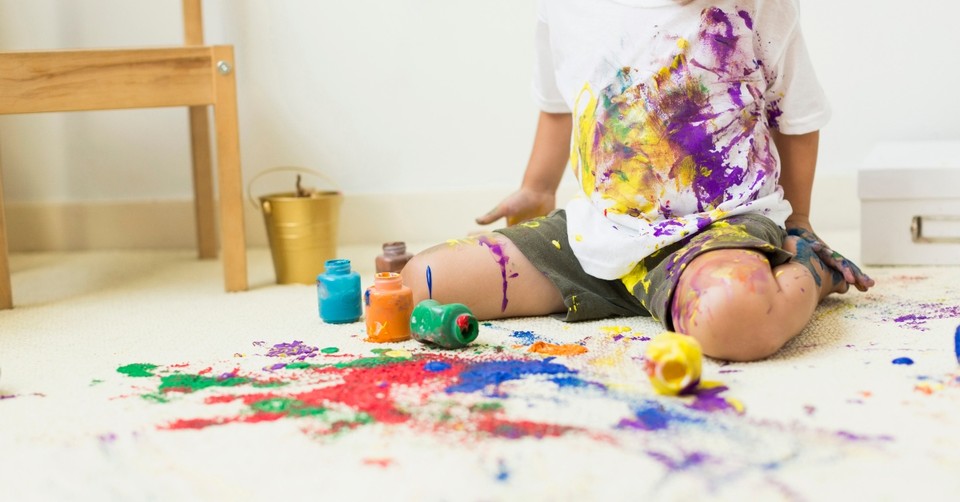10 Tips for Embracing the Mess as a Busy Mom

When my four children were young, I looked forward to sending them off to stay an entire week with my parents during the summer. The grandparents enjoyed spoiling the grandkids, and my kids had fun without mom or dad around. While I loved having some alone time, one of the best perks was cleaning my house—and then having it stay nearly pristine for the rest of the week.
Parenting is messy. From the baby's arrival through toddler and preschool stages into teen years, as a mom, you'll be cleaning up one mess after another. Babies spit up, toddlers ground food into the carpet, preschoolers spill glitter glue everywhere, third-graders track in dirt, tweens leave smelly towels on the bathroom floor, and teenagers get crumbs on the couch.
For us busy moms, all this mess can drive us batty, which can lead to a fractious relationship with our kids and added stress for us. I don't know about you, but I'd rather not be upset with my kids for messes all the time. How can we balance cleanliness with the mess kids make in our homes?
Here are ten suggestions for keeping your sanity while giving your kids the freedom to be, well, kids.
1. Expect some mess.
You need to anticipate a messy house when you have children and teenagers. That doesn't mean you have to live with dirt and debris all around you, but it does mean you shouldn't expect your kids will not make messes. It's unrealistic for children not to spill something, track something inside, or leave their shoes in the middle of the floor. Recognizing that fact will go a long way to helping you embrace the messiness of raising kids.
2. Let kids be kids.
This one can be difficult, but let's face it—children make messes, sometimes on purpose and sometimes on accident. When your baby learns to feed himself, he makes a huge mess. When your toddler learns to use the toilet, there will be accidents. When your preschooler makes you a birthday card, she will leave glue streaks and glitter behind on the tabletop. When your tween bakes cupcakes, the kitchen will look like a flour bomb went off. At all stages of life, as your kids learn to master new skills, there will be messes left behind. And that's okay.
3. Recognize your limits.
We each have a breaking point when it comes to household cleanliness. Whatever it is, own it and let your kids know. You'll need to remind them from time to time, but it can help them to know what annoys you the most. For me, it's clutter in the main areas of the home. Leaving books on the couch, a pile of clothes outside the bedroom door, and toys not put away at the end of the day are the things that bother me the most.
4. Lower your standards.
Yes, I realize this can seem counterproductive, but when you have kids, you need to learn to live with some messiness in your house. There's a time and place for delicate knickknacks on a coffee table, but having toddlers in the house probably isn't the right time or place. We should not hold onto our idea of neatness to the point where we make our kids feel unwelcome in their home.
5. Set realistic expectations.
Some children are naturally neat (I have one of those out of my four kids), but most are not. Some kids are oblivious to when they make a mess too. We need to recognize our children's strengths and weaknesses when it comes to messiness and adjust our own expectations accordingly. It's important that we not impose impossible standards on them regarding bedroom neatness and household cleanliness.
6. Say no sometimes.
It's okay to tell our kids they can't do something messy—and you don't have to have a "good" reason for saying no. You can simply not want to deal with a mess on a particular day, and that's okay. Our kids will not be crushed because they can't paint at the dining room table or make mud pies in the yard. Just be careful you don't say no all the time.
7. Designate "make a mess" days.
If the thought of glitter bombs daily is too much for you (and I'm with you on that!), have special "messy" days so your kids can indulge their inner creative genius without worrying about Mom's reaction. It's okay to say to our kids, "not now, but then" when it comes to potential messes. I certainly did when mine were smaller, and messes meant Mom needed to do most of the cleanup. Having specific days when you decide things are okay to get messy can work well.
8. Have a mess mantra.
I can't recall who said this to me, as I'd love to give them credit, but another wise mom said she always told her kids whenever they made a mess on accident: "It's okay. Things get spilled. Let's clean it up together." I love this as it tells the child messes are not the end of the world and things will happen despite our good intentions, so let's work together to put things right. Come up with your own mantra to say when your child accidentally makes a mess. We don't want our children to be afraid of our reactions when a mess happens.
9. Assign household chores.
Every child creates messes; therefore, every child should contribute to cleaning up those messes—including the normal "messes" that come from residing in a home. From dishwashing to laundry to bathroom cleaning, your children need specific daily and weekly chores to help with the upkeep of your home.
10. Train them in how to clean.
You'd think kids would know instinctively how to clean up a messy room, but that's not the case. We must show our kids how to do it, especially with children or teens who are easily overwhelmed by the task. Begin when they're toddlers and preschoolers by directing their toy pick-up, such as telling them to pick up the school bus first, then the fire truck. When they enter elementary school, train them on how to clean their room by focusing on different groups of items, such as putting all the dirty clothes in the hamper; blankets, pillows, and stuffed animals on the bed; and LEGOs in the toy bin. Work with them for several weeks until they get the hang of it, then supervise from afar.
Messiness doesn't have to take over your life as parents, nor do we have to live in pristine houses. Developing a balance between untidiness and cleanliness can be achieved by using these suggestions to help you and your kids embrace the mess.

Originally published February 17, 2023.







